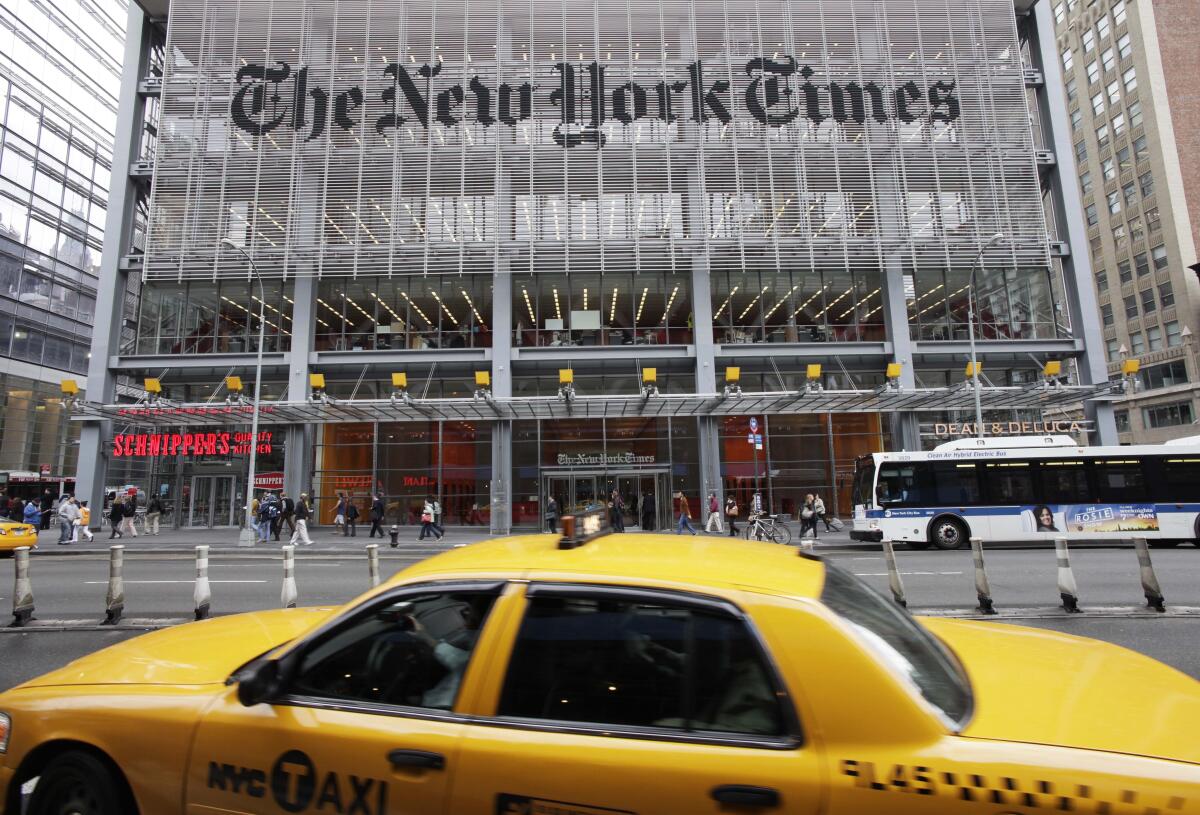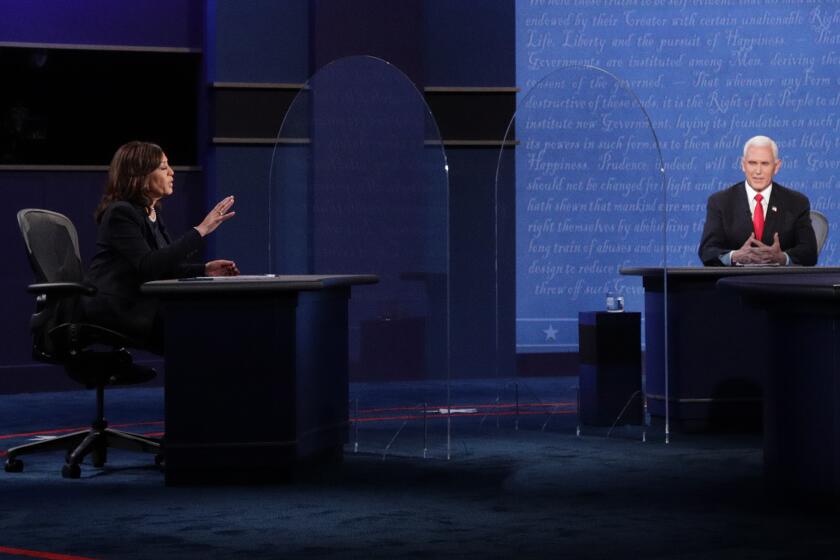Commentary: âCaliphateâ let listeners hear what they wanted to hear about Muslims. And fear sells

I should have trusted my instincts about âCaliphate.â
The New York Timesâ celebrated podcast promised listeners an insider perspective on the brutal, clandestine world of the Islamic State, or ISIS, over 10 wrenching and dramatic episodes: âIn the war on terror, who is it that weâre really fighting?,â reads Appleâs description of the series. ââCaliphateâ follows Rukmini Callimachi, who covers terrorism for the New York Times, on her quest to understand ISIS.â
Once a crown jewel in the Gray Ladyâs multimedia expansion, the award-winning production is now at the center of a scandal that pits profit and the race for more subscribers against journalistic integrity. The New York Times, like Hollywood and Washington, banked on Americansâ fear of terrorism â and won.
At least it seemed that way when the podcast arrived in 2018. Hosted by Callimachi, âCaliphateâ relied heavily on the firsthand account of one former ISIS fighter, middle-class Canadian recruit Abu Huzayfah. Eyewitnesses, reporters, civilians, victims and others on the ground in Syria and Iraq were also interviewed or quoted.
The hostâs perspective however, drove the narrative, and she delivered addictive, high-stakes drama tucked inside a tightly constructed storyline, which presented itself as an authentic guided tour through a lawless Middle East and its deadly plague of extremist fighters. Westerners mystified by the rise of ISIS would be able to gain access, and presumably insight, into the groupâs warped methodology and mindset from a safe distance.
But there was a problem.
In a scene from the documentary film âLast Men in Aleppo,â a Syrian civilian rescue squad known as the White Helmets rushes to a bombed-out apartment building on a residential street in Aleppo.

The journey felt staged and was littered with enough Pavlovian triggers â the call to prayer as a spooky prelude to terror, gunfire against bloodthirsty cries of Allah Akbar! â to make me question the podcastâs intention and authenticity. Huzayfahâs tales of how he was recruited and the atrocities he committed as well as Callimachiâs on-the-ground reporting, were wrenching but could also sound like scenes from âHomelandâ or âAmerican Sniperâ recast for a more worldly audience.
To be fair, I have not reported directly on ISIS or Al-Qaeda as Callimachi has done. But as a Muslim, Arab, Iraqi American and person who pays way too much attention to the intersection of politics and pop culture, Iâve developed a sixth sense when it comes to the mediaâs exploitation of Islam and the Middle East. Iâve written about war, the refugee crisis, womenâs rights, the film industry and even hip-hop in places such as Syria, Iraq, Jordan, Saudi Arabia, the Emirates, Egypt and Palestine and documented my own familyâs plight after the 2003 invasion of Baghdad.
Fear sells and so do the stereotypes and tropes that propagate such anxiety, which is exactly why âCaliphateâ set off my alarm bells. But the podcast came from the New York Times and Callimachi, a multiple Pulitzer Prize finalist. Plenty of smart folks were devouring the production, so I ignored those warning signs. I wish I hadnât.
Now, the podcastâs accuracy has been called into question, throwing those doubts into even sharper relief. Last month, Canadian police arrested Shehroze Chaudhry, also known as Abu Huzayfah, under the countryâs terrorism hoax laws, alleging Chaudhry lied about his involvement with ISIS. In fact, thereâs scant evidence that the podcastâs star informant about the terror group even visited Syria, much less fought alongside his brethren there.
Shortly after Huzayfahâs arrest was announced, the New York Times opened a review of âCaliphate,â and the podcast has since been scrutinized by media columnists at both the Washington Post and the New York Times itself.
Callimachiâs integrity has also been called into question and not just as it relates to âCaliphate.â Other journalists within the paper had reportedly expressed concern about her sources and the license she took in situations that were near-impossible to fact-check, during her tenure. But hungry to expand its reach, the paper pushed ahead with the podcast anyway.
Sen. Kamala Harris and Vice President Mike Pence faced off Wednesday in the 2020 vice presidential debate. And Harris refused, winningly, to be talked over.
It was an easy sell.
Muslim extremism, the barbaric Middle East, angry young men with strange names and stranger ideas about the will of God are fascinating enemies. Hollywood has long cashed in on that trepidation, while politicians have perfected the art of leveraging the threat of attacks from abroad to gin up support for foreign wars and domestic surveillance, despite data that shows homegrown perpetrators and groups account for the majority of all terrorist incidents in the United States since 1994.
The focus on the likes of Al-Qaeda and ISIS has even allowed another, more immediate threat to blossom under our noses: Right-wing extremists perpetrated two-thirds of the attacks and plots in the United States in 2019 and more than 90% between Jan. 1 and May 8 of this year.
Make no mistake: the gruesome reality of hostage-taking, videotaped executions, sex slaves, torture and mass killings has provided plenty of grist for the fearmongers, and the dangers of extremist groups have been and will remain a real force in our geopolitics. In-depth reporting is critical to exposing and understanding how these threats emerge, take root and grow as well as to documenting the war atrocities, complicit governments and failed foreign policies that accompany them.
But when a reputable outlet, via one of its star reporters, appears to lose sight of those goals in the pursuit of narrative journalism â using techniques familiar from scripted television â it isnât merely damaging to Muslims, whoâve been tarred with the same broad brush since the 9/11 attacks. It also renders suspect the critical contributions of the many journalists, often at great risk to themselves, who have produced irreproachable reporting about the ways ISIS and other violent organizations have reshaped our world.
Callimachi ultimately mastered one skill above all others, the winning podcast tenor that allows us to hear what we want to hear: an assured, confident delivery, with NPR-like intonation and enunciation, theatrical sound effects and a whimsical lilt when things got too heavy.
Itâs a satisfying rhythm and a solid business plan, one designed to draw listeners in rather than alienate them with challenging and endlessly complex subject matter. But when built atop the foundation of reporting that seems to have been shaky at best, itâs also a manipulation as well as a disservice. After all, the last thing any of us needs â Americans, Syrians and Iraqis alike â is more misinformation.
More to Read
The biggest entertainment stories
Get our big stories about Hollywood, film, television, music, arts, culture and more right in your inbox as soon as they publish.
You may occasionally receive promotional content from the Los Angeles Times.












